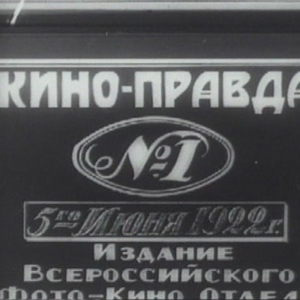
ACFNY SUPPORTED | FILM RETROSPECTIVE | DZIGA VERTOV | Kino-Pravda no. 23 (Radio Pravda) | Shagai, Sovet! (Stride, Soviet! (The Moscow Soviet in the Present, Past, and Future))
Kino-Pravda No. 23 (Radio Pravda) (1925, USSR)
Directed by Dziga Vertov
Unedited print. Approx. 23 min.
hough only a third of this final issue of Kino-Pravda seems to survive, we are nonetheless treated to Aleksandr Bushkin’s time-lapse animation and his brilliant sequence in which, as Yuri Tsivian describes, “a cross-section of a photographically correct izba(Russian peasant’s log hut) is penetrated by schematically charted radio waves”—a testament to the magical properties and propagandistic uses of radio in reaching out to Russia’s distant peasantry.
Shagai, Sovet! (Stride, Soviet! (The Moscow Soviet in the Present, Past, and Future)) (1926, USSR)
Directed by Dziga Vertov
Silent. Approx. 70 min.
As head of Kultkino, Goskino’s documentary section, Vertov was commissioned to make an election-year campaign film on behalf of the sitting Mossovet (Moscow Municipal Soviet). Never one to follow orders, he failed to include any images of Mossovet officials at work, or any evidence of their achievements, and the film was thus denounced by the Presidium Committee of the Moscow Soviet and largely boycotted by movie theaters. Their loss is our gain, however, because we can see Vertov’s 1922 manifesto “WE” put into practice: “For his inability to control his movements,” Vertov wrote, “WE temporarily exclude man as a subject for film. Our path leads through a poetry of machines, from the bungling citizen to the perfect electric man.” Automobiles, engines, factory tools are literally brought to life—“the hearts of the machines are beating”—and operate in perfect synchronicity toward the advancement of the New Russia.
With piano accompaniment by Donald Sosin.
ABOUT THE RETROSPECTIVE
Of all the masters of Soviet cinema—most notably Sergei Eisenstein, Lev Kuleshov, Vsevolod Pudovkin, and Grigori Aleksandrov—Dziga Vertov (né Denis Arkadievitch Kaufman, 1896–1954) is arguably the one whose still-radical experiments in image and sound, and enduring influence among an astonishing range of contemporary filmmakers and artists, from Jean-Luc Godard to Richard Serra to Steve McQueen, have yet to be fully appreciated or celebrated.
In close collaboration with the Austrian Cultural Forum New York and the Austrian Film Museum, MoMA has launched this retrospective, the most comprehensive ever assembled in the United States, and seeks to redress this with an extensive selection of Vertov’s silent films, sound features, and related work by collaborators and rivals in what Vertov called his “factory of facts.”
This screening is one of 11 programs of Vertov’s silent films, drawn primarily from the Austrian Film Museum’s unparalleled collection, including the premieres of fourteen Kino-Week films from 1918–19, and, for the first time together, all of his extant Kino-Pravda films from 1922–25. The retrospective continues with such masterworks as Stride, Soviet! (1926), A Sixth Part of the World (1926), The Eleventh Year (1928), Enthusiasm: Symphony of the Donbass (1930), Three Songs of Lenin (1935/38), and other sound films. Vertov’s exhilarating body of work must be seen not as a succession of individual films, but as one continuously evolving movie; “free of the limits of time and space,” he wrote, it would lead to “a fresh perception of the world” and a revolutionary passage from the Old to the New.
All films directed by Vertov, except where noted, and with simultaneous English translation or electronic subtitles. Screening descriptions adapted from texts by Yuri Tsivian and others, principally from the 23rd Pordenone Silent Film Festival catalogue.
VENUE
The Museum of Modern Art
Theater 2 (The Roy and Niuta Titus Theater 2), T2
11 West 53 Street
New York, NY 10019
www.moma.org
Film admission tickets can be purchased in person only. Museum members may reserve screening tickets online.
Please visit http://www.moma.org/visit/calendar/film_screenings/12172

